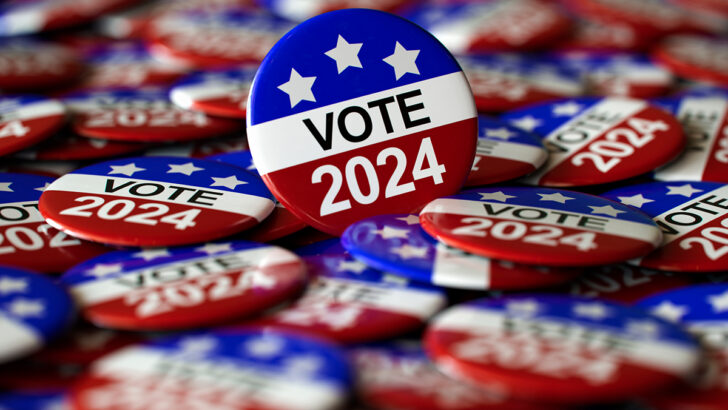As I am writing this column, the final ballots in the US election are yet to be cast. The result appears to be hanging in the balance, with polls suggesting that those favouring one candidate over the other are almost evenly divided. Like many observers, I have watched with interest the somewhat tumultuous nature of this presidential cycle – and the political commentary on it.
Reading Fintan O’Toole in full pearl-clutching mode in the pages of The Irish Times or listening to RTE’s ‘coverage’, one would be forgiven for thinking that the possibility of a Republican victory signals the end of democracy as we know it. One of the consistent observations (and complaints) from this side of the water is in relation to the lack of unity in the US, with the finger being pointed at former President Trump as a “divisive figure”.
What is interesting about the complaints of a lack of unity and the divided and divisive nature of political discourse in America, is that they come – almost overwhelmingly – from those who would regard themselves as liberal.
These commentators talk about how a candidate that unites everyone is what is needed. What they fail to address is how this can happen when approximately 50% of the population (if the polls are to be believed) do not agree with their liberal worldview.
Unite
The unspoken subtext to their comments is that what they really want is an enforced unity, where everyone is expected to ‘unite’ under the candidate of their choice. In other words, liberals want everyone to be liberal. This is a form of government, but not a democracy.
For anyone in the US who values freedom of religion and expression, or who opposes abortion, the ideological capture of education, or the transgender project, “unity” under the Democratic Party candidate would mean subjection to tyranny.
While democracy requires a majority rule, it does not mean that a minority who is not happy with the outcome should be crushed into submission, never to be allowed again to utter a complaint, as has happened here to pro-lifers since the 2018 referendum. The liberals who promote this idea of “unity” offend against the very principles of liberalism.
Having taken part in major national debates on marriage and abortion, as well as the more recent referenda on “care” and “women in the home”, I can say that conflict and division in the political sphere are not pleasant – but in a free society, they are sometimes necessary. Without them, there can be no free exchange of ideas, no testing of concepts, no examination of policies, no real choice given to people.
Those few brave politicians in Aontú and among the independents who stand out as being different are very much swimming against the tide”
While the two party system in the United States has its limitations, it at least offers voters what the late Phyllis Shlafly called “a choice, not an echo”. In Ireland, by contrast, the major political parties are practically indistinguishable from one another on most policy matters, and certainly on the so-called “social” issues, of which abortion is perhaps the most prominent.
Those few brave politicians in Aontú and among the independents who stand out as being different are very much swimming against the tide. When it comes to the major parties, voters who value life, marriage, the family, and the right of parents to educate their children as they see fit, are left out in the cold. The political outlook is even more bleak when one considers the overwhelming consensus from the academic and journalistic establishment.
The truth is that the striking characteristic of Irish political discourse is that it is actually devoid of any major conflict or any serious division on most matters of consequence. I, for one, find this to be utterly oppressive.
Democracy, the rule by the people, presupposes that the people have a choice (in other words, that there are differing proposals on offer) and that they are well-informed as to the different choices. A free media plays a crucial role in a democracy for this reason – its role is to test the ideas on offer, to hold politicians to account, and to level the playing field, so that smaller opposition or minority voices and independents can engage fairly and be able to challenge and debate the larger and more powerful voices.
Lockstep
Instead, what has happened in this country over the last couple of decades is that journalists have been overwhelmingly in lockstep with politicians – or rather it is the other way around. A small elite of journalists, broadcasters and academics has an outsized influence on political commentary, to the extent that they have direct influence on politicians without even having to lobby them.
It’s not so much that politicians fear falling out of favour with these commentators (although I am sure there is an element of that), it is more that in an effort to avoid conflict, politicians desperately covet the approval of this little group of influencers. Ireland is run by an oligarchy of liberal political commentators and politicians.
Nowhere was this more obviously shown to be the case than in the referenda run last March, when government NGOs, political commentators, journalists and all the major political parties were in direct opposition to the will of the people.
When we fundamentally disagree on whether something is right or wrong, then conflict is necessary and even good”
This was only highlighted because there happened to be a referendum on the issue; however, the vast majority of laws and policy are made without direct reference to the people. The oligarchy gets its way because there is no real opposition. Can you imagine how the people might have voted if the recent controversial SPHE curriculum had been put to them in a referendum?
Consensus
As Catholics, we know that neither consensus nor conflict is a good in itself. Consensus is good when there is agreement that what is right, is right, or that what is wrong, is wrong. But when we fundamentally disagree on whether something is right or wrong, then conflict is necessary and even good. Looking to the US then, the “divisive” election campaign may in fact be a good thing.
The electorate is being presented with a real choice: voters understand what is at stake, and which values the two candidates espouse, even if in their persons they do not always fully embody those values. The choice is stark. But at least American voters have a choice.


 Maria Steen
Maria Steen
